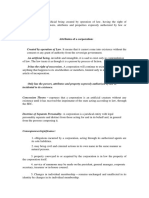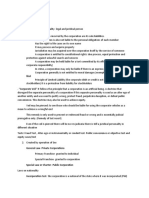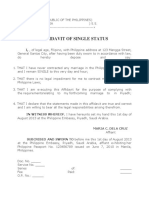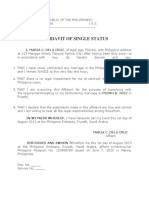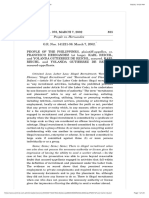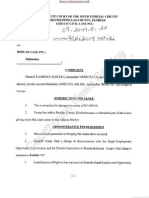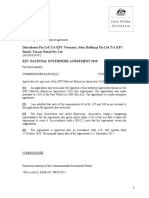0 ratings0% found this document useful (0 votes)
84 viewsChapter 1
Chapter 1
Uploaded by
Alvin Aparijado EmolagaA corporation is an artificial being created by law that has rights of succession and powers authorized by law. It is a creature of limited powers under the ultra vires doctrine. A corporation acquires juridical personality from the date of its SEC certificate of incorporation. It has four inherent attributes - it is an artificial being, created by law, has right of succession, and only has powers expressly authorized by law. There are two main theories on corporate existence - the theory of concession which views it as a creation of statute, and the theory of business enterprise which views it as an aggregation of people in a business. The separate juridical personality of a corporation can be pierced in cases of fraud or when the corporation is being used as an
Copyright:
© All Rights Reserved
Available Formats
Download as DOCX, PDF, TXT or read online from Scribd
Chapter 1
Chapter 1
Uploaded by
Alvin Aparijado Emolaga0 ratings0% found this document useful (0 votes)
84 views9 pagesA corporation is an artificial being created by law that has rights of succession and powers authorized by law. It is a creature of limited powers under the ultra vires doctrine. A corporation acquires juridical personality from the date of its SEC certificate of incorporation. It has four inherent attributes - it is an artificial being, created by law, has right of succession, and only has powers expressly authorized by law. There are two main theories on corporate existence - the theory of concession which views it as a creation of statute, and the theory of business enterprise which views it as an aggregation of people in a business. The separate juridical personality of a corporation can be pierced in cases of fraud or when the corporation is being used as an
Original Description:
Corp Law
Copyright
© © All Rights Reserved
Available Formats
DOCX, PDF, TXT or read online from Scribd
Share this document
Did you find this document useful?
Is this content inappropriate?
A corporation is an artificial being created by law that has rights of succession and powers authorized by law. It is a creature of limited powers under the ultra vires doctrine. A corporation acquires juridical personality from the date of its SEC certificate of incorporation. It has four inherent attributes - it is an artificial being, created by law, has right of succession, and only has powers expressly authorized by law. There are two main theories on corporate existence - the theory of concession which views it as a creation of statute, and the theory of business enterprise which views it as an aggregation of people in a business. The separate juridical personality of a corporation can be pierced in cases of fraud or when the corporation is being used as an
Copyright:
© All Rights Reserved
Available Formats
Download as DOCX, PDF, TXT or read online from Scribd
Download as docx, pdf, or txt
0 ratings0% found this document useful (0 votes)
84 views9 pagesChapter 1
Chapter 1
Uploaded by
Alvin Aparijado EmolagaA corporation is an artificial being created by law that has rights of succession and powers authorized by law. It is a creature of limited powers under the ultra vires doctrine. A corporation acquires juridical personality from the date of its SEC certificate of incorporation. It has four inherent attributes - it is an artificial being, created by law, has right of succession, and only has powers expressly authorized by law. There are two main theories on corporate existence - the theory of concession which views it as a creation of statute, and the theory of business enterprise which views it as an aggregation of people in a business. The separate juridical personality of a corporation can be pierced in cases of fraud or when the corporation is being used as an
Copyright:
© All Rights Reserved
Available Formats
Download as DOCX, PDF, TXT or read online from Scribd
Download as docx, pdf, or txt
You are on page 1of 9
Corporation Code Notes
I. Definition, Theories and Classifications
1. Definition
A corporation is an artificial being created by operation of law, having
the right of succession, and the powers, attributes and properties
expressly authorized by law or incident to its existence.
Ultra Vires Doctrine - that a corporation is a creature of the law granted
with limited powers, and thereby possesses only such powers as those
conferred by the Code or by its AOI, and those that are necessary or
incidental to the exercise of the express powers so conferred.
Powers of a corporation - Express, Incidental, Implied, Necessary =
when acted beyond the power, the action shall be considered as ultra
vires
When does it acquire juridical personality?
From the date of the issuance of SEC Certificate of Incorporation
Four Inherent Attributes of A Corporation:
1. It is an artificial being - capacity to contract and transact business
2. It is created by Operation of Law - It is created by law on corporation
and not by a special law
3. It has the right of succession - doctrine of strong juridical
personality
4. Having only such powers, attributes and properties expressly
authorized by law or incident to its existence - a creature of limited
powers
Shipside Inc. vs. CA (352 SCRA 334, 2001) - Being only a juridical
entity, the physical acts of the corporation, like the signing of
documents, can be performed only by natural persons duly authorized
for the purpose by corporate by-laws
2. Theories on Corporate Existence and Powers
a. Theory of Concession - before a corporation may acquire juridical
personality, the Statue must give its consent either in the form of a
special law or a general enabling act, and the procedure and conditions
provided under the law for the acquisition of such juridical personality
must be complied with.
b. Theory of Business Enterprise - Upon a corporation not merely as an
artificial being, but more importantly as an aggregation of persons
doing business through an underlying economic unit called the
"business enterprise."
Tan Boon Bee & Co. vs. Jarencio (163 SCRA 205, 1988) - corporations
are composed of natural persons and the legal fiction of a separate
corporate personality is not a shield for the commission of injustice and
inequity, such as to avoid the execution of the property of a sister
company.
3. Private Corporations Cannot Be created by specific
Legislative Act
Except for GOCCs, private corporations cannot be given a special
charter, but may incorporate only pursuant to a general enabling law
i.e. Corporation Code (Sec. 16, Art. XII, 1987 Constitution)
Feliciano vs. COA - Congress cannot enact a law creating a private
corporation with a special charter. Such legislation would be
unconstitutional, since private corporations may exist only under a
general law. Therefore, all water districts, which are not created under
the Corporation Code but pursuant to PD 198, are deemed to be
GOCCs and within the jurisdiction of COA.
4. Four Basic Advantages of Corporate Organizations
a. Strong Juridical Personality
A corporation has a personality separate and distinct from its individual
stockholders or members.
Shareholders are in no legal sense the owners of corporate property or
credit which is owned by the corporation as a distinct legal person.
the interest of shareholders in a corporate entity is purely inchoate effect: it will not entitle them to intervene in a litigation involving
corporate property
Unlike in partnership - the right of succession of a corporation allows it
to maintain a separate juridical personality in spite of the death,
withdrawal, insolvency of the stockholders or members who constitute
it.
b. Limited Liability to Investors
GR: stockholders in a stock corporation are personally liable for
corporate debts and liability ONLY to the extent of what they have
invested (paid-up) and what they have promised to invest (unpaid
sub)
c. Centralized Management
Except when otherwise provided in the Corporation Code, all corporate
powers and all corporate properties are vested in the Board of
Directors/Trustees. The stockholders or members do not have
management powers over operations and assets of the corporation.
d. Free Transferability of Units of Ownership
stockholders hold their shares as personal property with rights to
dispose, assign or encumber them as they may desire
5. Main Doctrine on Separate Juridical Personality
A corporation has a personality separate and distinct from that of its
stockholders or members, and the officers that represent it.
Applications of Main Doctrine:
General Presumption: A corporation is a bonafide corporation and
should alone be liable for its corporate acts and liabilities
Being an officer or stockholder of a corporation does not by itself make
one's property also that of the corporation. The corporate debt or
credit of the corporation is not the debt or credit of the stockholder,
vice versa.
GR: A corporate officer cannot be held personally liable for the
consequences of his acts,
Provided:
It is done in behalf of the corporation
It is done in good faith
It is within the scope of their authority
Secosa vs. Heirs of Erwin Suarez Francisco (2004): The President
cannot be held personally liable for the accident caused by its truck
driver
Del Rosario vs. Bascar (1992): The treasurer cannot be held liable for
the judgment rendered against the corporation
Mere ownership of a stockholder or by another corporation of ALL or
NEARLY ALL of the capital stock of a corporation is not of itself
sufficient ground for disregarding the separate corporate personality
A subsidiary corporation has an independent and separate juridical
personality, distinct from that of its parent company, hence, any suit
against the latter cannot bind the former.
Tax privileges enjoyed by a corporation do not extend to its stockholder
Stockholders have no standing to recover for themselves moral
damages proportionate to their equity holdings
6. Piercing the Veil of Corporate Fiction
The separate personality of a corporation may be disregarded as the
courts will look at the corporation as an aggregation of persons
undertaking business as a group.
Effect: To place personal liability on its members or stockholders. A
corporation will be looked upon the same personality with its owners.
1.
2.
3.
Types of Piercing Application
Equity piercing - defeat of public convenience as when the corporate
fiction is used as a vehicle for the evasion of an existing obligation
Fraud piercing - Fraud cases, as when the corporation is used to justify
a wrong, protect fraud, or defend a crime
Alter ego piercing - where a corporation is merely an instrumentality,
agency, conduit or adjunct of another corporation
Who can Invoke Piercing Doctrine? The one who can invoke the
piercing doctrine is the victim of the fraud or wrong
note: One cannot invoke the doctrine to save itself from transactions
which it knew to be defective or contrary to the law, rules or
regulations applicable to its industry - principle of estoppel
note: In the absence of clear and convincing evidence to show that the
corporate personalities were used to perpetuate fraud, or circumvent
the law, the corporation are to be rightly treated as distinct and
separate from each other.
Cases on Fraud Piercing Cases 1. When the corporate officer has used the corporate fiction to defraud
a third party, or that he has acted negligently, maliciously or in bad
faith, the corporate fiction may be pierced to make both the officer and
the corporation liable.
case: Namarco vs. Associated Finance Co. (1967) - where a
stockholder, who has absolute control over the business and affairs of
the corporation, entered into a contract with another corporation
through fraud and false representations, such stockholder shall be
liable solidarily with co-defendant corporation even when the contract
sued
2. When corporate officers to fraudulent or illegal acts in the name of
the corporation
case: Enriquez Security Services vs. Cabotaje (2006) - The attempt to
make the security agencies appear as two separate entities, when in
reality they were but one, was a devise to defeat the law because the
reason of the separation is to avoid labor claims
3. When one tries to evade civil liability by incorporating the properties
or the business to insulate them from judgment creditors and
employing the doctrine of limited liability.
7. Nationality of Corporation
Rule: The primary test of nationality in the Philippine Jurisdiction is the
place of incorporation test.
Place of Incorporation - the corporation is a national of the country
under whose laws it is organized or incorporated.
Special Rules: Apply Control test - the nationality of the majority of
the stockholders
a. Exploitation of Natural Resources
"Only Filipino citizens or corporations whose capital stock are at least
60% owned by Filipinos can qualify to exploit natural resources" (Sec.
2, Article XII, 1987 Philippine Constitution)
b. Ownership of Land
Only corporation with at least 60% Filipino equity can own land in the
Philippines.
c. Public Utilities
No franchise, certificate or any other form of authorization for the
operation of a public utility shall be granted except to citizens of the
Philippines or to corporations or associations organized under the laws
of the Philippines at least 60% of whose capital is owned by such
citizens.
d. War Time Test
If the controlling stockholders are enemies, then the veil of corporate
fiction will be pierced and the nationality of the corporation will be
aced on the citizenship of the majority stockholders in times of war
e. Grandfather Rule
Situation: where there are 2 corporations where 1 corporation is a
shareholder of another corporation
Rule: where shares belonging to corporations or partnerships at least
60% of the capital of which is owned by Filipino citizens shall be
considered as of Philippine nationality
8. Matters Pertaining to Corporation as "Persons"
a. Liability for Torts
Rule: a corporation can be held liable for torts or damages committed
by its officers for corporate purpose.
case: PCI Bank vs. CA (2001) - a banking corporation is liable for the
wrongful or tortuous acts and declarations of its officers or agents
within the course and scope of their employment.
b. Liability for Crimes
Rule: Since a corporation is a mere legal fiction, it cannot be held liable
for a crime committed by its officers, since it does not have the
essential element of malice
However, a stockholder may be held liable for acts committed by the
corporation if:
he had knowledge of the criminal act committed in the name of the
corporation, and
he took part in the same or gave consent to its commission
c. Non-entitlement to Moral Damages
Moral damages include the physical suffering, mental anguish, fright,
serious anxiety, besmirched emotions, wounded feelings, moral shock,
social humiliation, and similar injury.
GR: a corporation - being an artificial person which has no feelings,
emotions or senses, and which cannot experience physical suffering or
mental anguish - is not entitled to moral damages.
Exception: when the corporation has a reputation that is debased,
resulting in its humiliation in the business realm.
9. Classifications of Corporations
a. Stock Corporation - one which has a capital stock dividend into
shares and is authorized to distribute to the holders of such shares
dividends or allotments of the surplus profits on the basis of the shares
held. A stock corporation is organized for profit. The governing body is
usually the Board of Directors.
b. Non-stock corporation - one expressly organized for eleemosynary
purpose, and where no part of its income is distributable as dividends
to its members, trustees, or officers, subject to the provisions of the
Code on dissolution. It is one not organized for profit. The governing
body is usually the Board of Trustees.
c. Corporation de Jure - a corporation organized in accordance with the
requirements of law.
d. De Facto Corporation - a corporation where there exists a flaw in its
incorporation.
Rule on De Facto Corporation
Rule: the defect in the juridical personality of a corporation cannot be
inquired into by private individuals, much less used as a defense to
avoid claims
Except: in a quo warranto proceeding brought on behalf of the State
where the main action is to question the validity or existence of such
juridical personality.
Reason: grant to juridical personality is an exercise of State power and
not a matter of private affair
Requisites of de facto corporation:
a. organized under a valid law;
b. bona fide compliance with formalities of law
c. user of corporate powers
d. SEC issuance of certificate of incorporation
Ex. A,B,C,D, and E decided to form a corporation, A Inc. The AOI were
prepared but by omission in good faith, D and E failed to sign. SEC did
not notice the omission and so it issued a certificate of incorporation.
Later, the omission was discovered.
Who questions? it is only the Solicitor General who may do so in a quo
warrant proceedings.
e. Corporation by Estoppel - All persons who assume to act as a
corporation knowing it to be without authority to do so shall be liable
as general partners for all debts, liabilities and damages incurred or
arising as a result thereof.
On the part of the corporation - they are subsequently estopped from
claiming lack of corporate life in order to avoid liability
On the part of any person who assumes an obligation to an ostensible
corporation - cannot resist performance thereof on the ground that
there was in fact no corporation
f. Public Corporation - one formed or organized for the government of a
portion of the State. Its purpose is for the general good and welfare.
g. Private Corporation - one formed for some private purpose, benefit,
aim or end.
h. Corporation Sole - one organized for purpose of administering and
managing, as trustee, the affairs, property and temporalities of any
religious denomination, sect or church, by the chief archbishop, bishop,
priest, minister, rabbi or other presiding elder of such religious
denomination, sect, or church.
It is the exception to the general rule that at least 5 members are
required for a corporation to exist.
i. Domestic Corporation - a corporation formed, organized or existing
under the laws of the Philippines.
j. Foreign corporation - a corporation formed, organized or existing
under any laws other than those of the Philippines and whose laws
allows Filipino citizens and corporations to do business in its own
country or state.
10. Corporators and Incorporators, Stockholders and Members
a. Incorporators - those stockholders or members mentioned in the AOI
as originally forming and composing the corporation and who are
signatories thereof.
GR: Only natural persons may be incorporators of a corporation, or at
least 5 of them should be individuals
Rationale: Incorporators guaranty to the world that the AOI are true
and if it turns out that there is falsity, the incorporator may be held
liable for damages caused thereby.
b. Corporators - those who compose the corporation, whether as
stockholders or members
c. Stockholders or Shareholders - owners of shares in a cop oration
which has a capital stock
d. Members - corporators of a corporation which has no capital stock.
11. Shares of Stock
a. Meaning
Shares of stock is a fractional share of ownership in a business.
b. General Rule on Classification of Shares:
The shares of stock may be divided into classes or series of shares, or
both, any of which classes or series of shares, or both, any of which
classes or series of shares may have such rights, privileges or
restrictions thus must be stated in the articles of incorporation in order
to be valid.
Exceptions:
1. No shares may be deprived of voting rights except preferred or
redeemable shares
2. There shall always be a class or series of shares which have
complete voting rights
3. Any or all of the shares may have a part value or have no par value
as may be provided for the in AOI, except that banks, trust companies,
insurance companies, public utilities and building and loan associations
shall not be permitted to issue no par value shares of stock.
c. Kinds of Shares:
1. Common Shares - a stockholder, owner of at least one common
share has the following rights:
right to vote at meetings
right to dividends
right to examine corporate books
2. Preferred Shares - may enjoy a right of preference in:
dividends
voting (particularly in election of directors)
corporate property upon dissolution
Limitations:
Preferred shares can only be issued with par value
Preference must be: a. stated in the AOI, or b. may be fixed by the BOD
as authorized by AOI
Rationale: it is designed to induce persons to subscribe to the shares of
a corporation
3. Par Value Shares - their value is fixed in the AOI, which is nominal
value remains the same regardless of the profitability of the
corporation
4. No-Par Value Shares - they have no assigned value, their value being
dependent on the changes in the profits of the corporation and the
market value of the shares themselves at the time the shares are
issued.
Minimum consideration: P5.00
The following cannot issue no-par value shares:
Banks;
Insurance Companies;
Trust Companies;
Building & Loan Associations;
Public Utilities
Reason that they cannot issue: they deal with the public and most of
them manage the savings of the people; thus, to protect the investing
public by making sure that such corporations have sufficient funds to
determine financial viability, they cannot issue no-par value
5. Redeemable shares - shares that has been repurchased, reacquired
by the corporation which issued the stock in exchange for property,
whether or not the acquired stock is cancelled, retired or held in
treasury. They can only be issued when expressly authorized by the
AOI.
6. Founders' Shares - these must be provided for in the articles of
incorporation, which would be entitled to vote and be voted directors
to the Board of Directors.
Limitation: good only for 5 years from the date of the approval by SEC.
7. Treasury Stock - shares of stock which have been issued and fully
paid for, but subsequently re-acquired by the issuing corporation by
purchase, redemption, donation, or through some other lawful means.
8. Escrow Shares - shares that specifically segregated and to be issued
subject to a condition.
You might also like
- The Corporation Code Reviewer PDFDocument28 pagesThe Corporation Code Reviewer PDFJaja Ordinario Quiachon-Abarca90% (41)
- Commercial Law - Corporation Law - Villanueva ReviewerDocument54 pagesCommercial Law - Corporation Law - Villanueva Reviewerwhisper13941100% (2)
- TopCoder Member Tax Form W-8BENDocument1 pageTopCoder Member Tax Form W-8BENAnonymous FLvU583CNo ratings yet
- Corporation Law Notes Atty Zarah Villanueva CastroDocument31 pagesCorporation Law Notes Atty Zarah Villanueva CastroAbigail Anzia100% (1)
- Affidavit Response To 1040 - SampleDocument5 pagesAffidavit Response To 1040 - Samplediversified1100% (1)
- Debt Validation Letter 04Document2 pagesDebt Validation Letter 04Trevor Harris100% (1)
- Corporation General Principles What Is A Corporation?Document5 pagesCorporation General Principles What Is A Corporation?Mirela VerzosaNo ratings yet
- Quiz CorpoDocument24 pagesQuiz Corpokunta kinteNo ratings yet
- CorporationDocument28 pagesCorporationJohn cookNo ratings yet
- Corporation CODE - Villanueva NotesDocument70 pagesCorporation CODE - Villanueva NotesNorly Villanueva100% (1)
- Corpo Q&ADocument202 pagesCorpo Q&ANeil RiveraNo ratings yet
- Revised Corporation Code NotesDocument36 pagesRevised Corporation Code NotesWinna Yu OroncilloNo ratings yet
- Corporation Notes - Law3ADocument51 pagesCorporation Notes - Law3ATannaoNo ratings yet
- Rev BLRDocument8 pagesRev BLRJester BorresNo ratings yet
- Corporation Notes Title I-IIIDocument17 pagesCorporation Notes Title I-IIISharn Linzi Buan MontañoNo ratings yet
- Corporation Law: Revised Corporation Code of THE PHILIPPINES (R.A. No. 11232)Document91 pagesCorporation Law: Revised Corporation Code of THE PHILIPPINES (R.A. No. 11232)Grace HiaviaNo ratings yet
- Notes On CorporationDocument5 pagesNotes On CorporationCristine Jewel CorpuzNo ratings yet
- CorpoDocument10 pagesCorpojunett calubaquibNo ratings yet
- Corporation Law OutlineDocument131 pagesCorporation Law OutlineNora LupebaNo ratings yet
- Corporation: Republic Act No. 11232 Revised Corporation Code (2019)Document12 pagesCorporation: Republic Act No. 11232 Revised Corporation Code (2019)Steffanie Olivar100% (1)
- Consolidated Zarah NotesDocument174 pagesConsolidated Zarah Notespoiuytrewq9115No ratings yet
- Reviewer Corpo MidtermsDocument10 pagesReviewer Corpo MidtermsDennis Aran Tupaz AbrilNo ratings yet
- LAWDocument7 pagesLAWjames rojasNo ratings yet
- Corporation ExamDocument5 pagesCorporation ExamVincent John DalaotaNo ratings yet
- Corporation Law NotesDocument38 pagesCorporation Law NotesToshirouHitsugaya100% (2)
- I. Article Xii Sec. 16 1987 Constitution Section 16. The Congress Shall Not, Except by General Law, Provide For TheDocument9 pagesI. Article Xii Sec. 16 1987 Constitution Section 16. The Congress Shall Not, Except by General Law, Provide For TheMaria Victoria Z. MatillanoNo ratings yet
- AC201 PointersDocument8 pagesAC201 Pointersaltheaemelo24No ratings yet
- Midterm TopicsDocument21 pagesMidterm TopicsSantiago Joanna MarieNo ratings yet
- Rules in RCC and OCC RequiredDocument8 pagesRules in RCC and OCC RequiredXNo ratings yet
- G5law 1Document124 pagesG5law 1Eleah Kim PamplonaNo ratings yet
- Corporation Law Notes Sundiang AquinoDocument19 pagesCorporation Law Notes Sundiang AquinoWnz Naive100% (2)
- Notes in Business Laws and RegulationsDocument10 pagesNotes in Business Laws and RegulationsZie TanNo ratings yet
- Reviewer - Corpo CodeDocument152 pagesReviewer - Corpo CodeRaina FerreraNo ratings yet
- Corporation LawDocument36 pagesCorporation LawJanus Mari100% (1)
- I. Corporation: 1. Place of Investigation 2. Citizenships of Stockholders 3. Ground For The RuleDocument10 pagesI. Corporation: 1. Place of Investigation 2. Citizenships of Stockholders 3. Ground For The RuleKhaiye De Asis AggabaoNo ratings yet
- Today's Topics (March 31, 2022)Document51 pagesToday's Topics (March 31, 2022)Miguel Anas Jr.No ratings yet
- Commercial LawDocument34 pagesCommercial LawAlfred Dominic MendozaNo ratings yet
- Corporation Definition - Legal Form of Business That Is Separate From Its Owners.Document39 pagesCorporation Definition - Legal Form of Business That Is Separate From Its Owners.Amalia Tamayo YlananNo ratings yet
- Corporation Code: Atty. Aaron Bailey G. SantosDocument86 pagesCorporation Code: Atty. Aaron Bailey G. SantosajdgafjsdgaNo ratings yet
- Liability of Corporations For Torts 1Document31 pagesLiability of Corporations For Torts 1Mikkboy RosetNo ratings yet
- Corp CodeDocument59 pagesCorp CodeRochelle CiprianoNo ratings yet
- Finals Reviewer RCC 2Document95 pagesFinals Reviewer RCC 2MARCK JULLIAN ALFONSONo ratings yet
- Private Corporations Preliminaries DiscussionDocument7 pagesPrivate Corporations Preliminaries DiscussionMay ToyokenNo ratings yet
- Corpo Law 1Document7 pagesCorpo Law 1kb.sarmientoNo ratings yet
- Corporation Law RevDocument2 pagesCorporation Law RevMay Quinto-SalazarNo ratings yet
- Corporation LawDocument98 pagesCorporation LawLyndon SoroteNo ratings yet
- Corporation EVSU 1Document89 pagesCorporation EVSU 1Barangay MagkasagNo ratings yet
- R.A 11232 - Title 1Document24 pagesR.A 11232 - Title 1Ana AmolatNo ratings yet
- Corporation - Insurance (Lecture Transcriptions)Document160 pagesCorporation - Insurance (Lecture Transcriptions)Vanessa Evans CruzNo ratings yet
- Commercial Law Review Set 2Document13 pagesCommercial Law Review Set 2mina villamorNo ratings yet
- Corporation Code - NotesDocument37 pagesCorporation Code - NotesPamela Daneth AgondezNo ratings yet
- Corporation and Securities NotesDocument7 pagesCorporation and Securities NotesJorge BandolaNo ratings yet
- Title I: Gen. ProvisionsDocument6 pagesTitle I: Gen. ProvisionsAnnie JuliaNo ratings yet
- Business Law and Regulations - CorporationDocument15 pagesBusiness Law and Regulations - CorporationMargie RosetNo ratings yet
- Business Law and RegulationDocument23 pagesBusiness Law and RegulationJhun Chester LalongisipNo ratings yet
- Piercing the Corporate Veil: A Comprehensive Guide for AttorneysFrom EverandPiercing the Corporate Veil: A Comprehensive Guide for AttorneysNo ratings yet
- Dividend Investing: The best Techniques and Strategies to Get Financial Freedom and Build Your Passive IncomeFrom EverandDividend Investing: The best Techniques and Strategies to Get Financial Freedom and Build Your Passive IncomeNo ratings yet
- Textbook of Urgent Care Management: Chapter 6, Business Formation and Entity StructuringFrom EverandTextbook of Urgent Care Management: Chapter 6, Business Formation and Entity StructuringNo ratings yet
- AffidavitDocument1 pageAffidavitAlvin Aparijado EmolagaNo ratings yet
- Affidavit of Single Status: I,, of Legal Age, Filipino, With Philippine Address at 123 Mangga StreetDocument1 pageAffidavit of Single Status: I,, of Legal Age, Filipino, With Philippine Address at 123 Mangga StreetAlvin Aparijado EmolagaNo ratings yet
- Affidavit of Single Status: I, MARIA C. DELA CRUZ, of Legal Age, Filipino, With Philippine AddressDocument2 pagesAffidavit of Single Status: I, MARIA C. DELA CRUZ, of Legal Age, Filipino, With Philippine AddressAlvin Aparijado EmolagaNo ratings yet
- Embassy of The Republic of TheDocument2 pagesEmbassy of The Republic of TheAlvin Aparijado EmolagaNo ratings yet
- ObservationDocument20 pagesObservationAlvin Aparijado EmolagaNo ratings yet
- Intl AssignmentDocument12 pagesIntl AssignmentAlvin Aparijado EmolagaNo ratings yet
- Chapter III: BY LAWS 1. Nature of by LawsDocument3 pagesChapter III: BY LAWS 1. Nature of by LawsAlvin Aparijado EmolagaNo ratings yet
- Interview With Captain Darwin FernandezDocument2 pagesInterview With Captain Darwin FernandezAlvin Aparijado EmolagaNo ratings yet
- Fallacies of PresumptionDocument3 pagesFallacies of PresumptionAlvin Aparijado EmolagaNo ratings yet
- Chapter Vi: Rights of Stockholders and MembersDocument7 pagesChapter Vi: Rights of Stockholders and MembersAlvin Aparijado EmolagaNo ratings yet
- Philippine Supreme Court DecisionsDocument139 pagesPhilippine Supreme Court DecisionsAlvin Aparijado Emolaga100% (1)
- Instructions For Schedule R (Form 941) : (Rev. June 2021)Document3 pagesInstructions For Schedule R (Form 941) : (Rev. June 2021)Josh JasperNo ratings yet
- CHED Scholarship Form 2020 PDFDocument1 pageCHED Scholarship Form 2020 PDFKyle SantosNo ratings yet
- Prelims Reviewer - Ca 141Document12 pagesPrelims Reviewer - Ca 141Andrea IvanneNo ratings yet
- 796 Supreme Court Reports Annotated: Mateo vs. MorenoDocument7 pages796 Supreme Court Reports Annotated: Mateo vs. MorenoUfbNo ratings yet
- P L D 2020 Sindh 400Document11 pagesP L D 2020 Sindh 400IRFAN BA LLBNo ratings yet
- Summary of Evidence-1Document27 pagesSummary of Evidence-1Snigdha SharmaNo ratings yet
- People vs. Hernandez PDFDocument20 pagesPeople vs. Hernandez PDFKrissaNo ratings yet
- AramarkForm ADocument2 pagesAramarkForm ASw IsNo ratings yet
- Jose Rizal University (Memorandum of Agreement)Document6 pagesJose Rizal University (Memorandum of Agreement)Jobelle Cariño ResuelloNo ratings yet
- Abizadeh - Introduction Rome StatuteDocument9 pagesAbizadeh - Introduction Rome Statuteho_jiangNo ratings yet
- Marantan Vs DioknoDocument13 pagesMarantan Vs DioknovickimabelliNo ratings yet
- Whole Woman's Health v. Jackson CA5 Certification Argument Scheduling OrderDocument10 pagesWhole Woman's Health v. Jackson CA5 Certification Argument Scheduling OrderWashington Free BeaconNo ratings yet
- The Local Treasury Operations Manual: Book 5Document46 pagesThe Local Treasury Operations Manual: Book 5Isaac100% (3)
- 100 Defined Terms Doctrines and Principles in PilDocument14 pages100 Defined Terms Doctrines and Principles in PilErmi YamaNo ratings yet
- Mauritius - Police Academy, Forensic Science Laboratory, and National Library - LOCDocument3 pagesMauritius - Police Academy, Forensic Science Laboratory, and National Library - LOCrisingrishuNo ratings yet
- Digested Case in PALEDocument1 pageDigested Case in PALEHoneyNo ratings yet
- Interim Order - Great Overseas Commodeal LimitedDocument11 pagesInterim Order - Great Overseas Commodeal LimitedShyam SunderNo ratings yet
- LOI BPATsDocument15 pagesLOI BPATsPCADB PANGASINANNo ratings yet
- Petition For Adoption of A MinorDocument1 pagePetition For Adoption of A MinorYulo Vincent Bucayu PanuncioNo ratings yet
- Complaint: Sereka V BobCad Cam, Inc - Sexual Harassment and Enforced Scientology Classes On The JobDocument9 pagesComplaint: Sereka V BobCad Cam, Inc - Sexual Harassment and Enforced Scientology Classes On The JobMary McConnell100% (1)
- Rule 116 Arraignment and PleaDocument5 pagesRule 116 Arraignment and Pleaproxy_anneNo ratings yet
- Econtracts PsdaDocument4 pagesEcontracts PsdaSuhavi SalujaNo ratings yet
- City of Albuquerque Ethics Complaint: Roxanna Meyers Improper InfluenceDocument2 pagesCity of Albuquerque Ethics Complaint: Roxanna Meyers Improper InfluencePat DavisNo ratings yet
- KFC National Enterprise Agreement 2010Document40 pagesKFC National Enterprise Agreement 2010Hohoho134No ratings yet
- Journal HomepageDocument19 pagesJournal Homepageاحمد العنسيNo ratings yet
- Adjudication Manual 1988Document6 pagesAdjudication Manual 1988abidjaNo ratings yet
- Syllabus UCC Business Law and RegulationsDocument7 pagesSyllabus UCC Business Law and RegulationsArki Torni100% (1)







